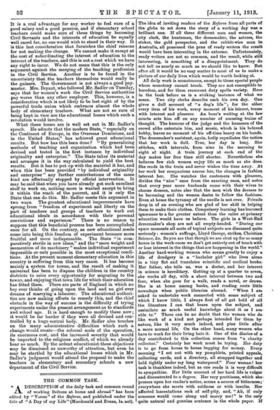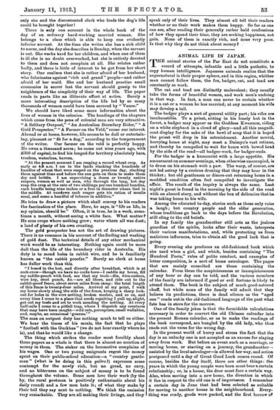THE COMMON TASK.
“ A DESCRIPTION of the daily task and common round of working Britons at home and abroad" has been • edited by " Vanoc" of the Referee, and published under the title of "A Day of my Life" (Macdonald and Evans, is. net). The idea of inviting readers of the Referee from all parts of the globe to, set down the story of a working day was a brilliant one. If all these different men and women, the city clerk, the huntsman, the dressmaker, the actress, the stoker, the gold prospector, and the rabbit-wire man in Australia, all possessed the pens of ready writers the result would have been interesting in the extreme. Unfortunately, ready writers are not so common, and the result, while still interesting, is something of a disappointment. They do not tell us nearly so much as we should like to know. But after all it would be no easy matter to most of us to make a picture of our daily lives which would be worth looking at.
Ail daily work is monotonous, except to those special people whom monotony cannot touch. They are not susceptible to boredom, and for them recurrent duty spells variety. Here in the book before us is a striking instance of what we mean. Two city clerks describe each his own day. One gives a dull account of "a dog's life "; for the other every item of his work, every moment of his leisure, teems with interest and pleasure. An hour's waiting at the law courts sets him off on any number of amusing trains of thought. The humour of the judge and the humours of the crowd alike entertain him, and music, which is his beloved hobby, leaves no moment of his off-time heavy on his hands. The dressmaker's assistant, again, hotly repudiates the notion that her work is dull. True, her day is long. She stitches, with intervals, from nine in the morning to eight at night. A train journey at each end of the day makes her free time still shorter. Nevertheless she believes few rich women enjoy life as much as she does. She reads in the train and never wishes the time away. At her work her companions amuse her, the changes in fashion interest her. She watches the customers with pleasure, divides the " nice " ones from the exacting ones, and notes that every year more husbands come with their wives to choose dresses, notes also that the men wish the dresses to be becoming and the women desire to follow the fashions. Even at home the tyranny of the needle is not over. Friends drop in of an evening who are glad of her skill in helping them to make their clothes. Compulsory learning has leavened. ignorance to a far greater extent than the railer at primary education would have us believe. The girls in a West-End dressmaker's shop are not all empty-headed. "During our spare moments all sorts of topical subjects are discussed quite seriously : women's suffrage, Lloyd George, strikes, Christian Science, Sze. So you see that though we are shut up for so many hours in the work-room we don't get entirely out of touch with or lose interest in the things that are happening in the world." Another hard-working woman who seems greatly to enjoy a life of drudgery is a "bachelor girl" who lives alone in a tiny flat and translates scientific and medical books. Her father, she tells us, was a doctor, and her interest in science is hereditary. Getting up at a quarter to seven, she works all day, with a short interval between two and four, when she goes for a walk, reads a novel, or draws. She is at home among books, and reading costa little nowadays when public libraries abound. "When I am asked to undertake work connected with some subject of which I know little, I always first of all get hold of all the literature I can that bears upon the subject, and assimilate as much useful knowledge about it as I am, able to." There can be no doubt that the women who do like work of a kind not perhaps intended for them by nature, like it very much indeed, and pine little after a more normal life. On the other hand, many women who have to work for their living hate it. One of the diaries of a day contributed to this collection comes from "a charity collector." Certainly her work must be trying. Her duty is to go from house to house begging for money. Every morning "I set out with my pamphlets, printed appeals, collecting cards, and a directory, all strapped together and held tightly under my long waterproof." Poor woman! her task is thankless indeed, but as one reads it is very difficult to sympathize. Her little account of her hard life is vulgar and discontented to a degree. Her very prettiness, which she 'presses upon her reader's notice, seems a source of bitterness; • everywhere she meets with coldness or with insults. Her 'affected lamentations reek of self-pity, and, " Ah, if only someone would come along and marry me !" is the only quite natural and genuine sentence in the whole paper. If
only she and the discontented clerk who leads the dog's life could be brought together!
There is only one account in the whole book of the day of an ordinary hard-working married woman. She belongs to a class which is able to keep one evidently inferior servant. At the time she writes she has a sick child to nurse, and the day she describes is Sunday, when the servant is out. She works hard for her children, and when one of them is ill she is no doubt overworked, but she is entirely devoted to them and does not complain at all. She relates rather badly, and there is little of interest to be got from her short story. One realizes that she is rather afraid of her husband, who fulminates against "rich and grand" people—and rather afraid of her maid. She and her husband practise small economies in secret lest the servant should gossip to the neighbours of the simplicity of their way of life. The paper reads in parts like an illiterate effort at satire. Surely a more interesting description of the life led by so many thousands of women could have been secured by " Vanoc." We should have liked some more information about the lives of women in the colonies. The headings of the chapters which come from the pens of colonial men are very attractive.
"A. Solitary Outpost," "An Australian Boundary Rider," "A Gold Prospector," "A Farmer on the Veld," rouse our interest. Abroad or at home, however, life seems to be dull or entertain- ing, pleasant or `' fit for a dog," according to the temperament of the writer. Our farmer on the veld is perfectly happy.
He owns a thousand acres ; he came out nine years ago, with :300 of capital, to find his longed-for territory absolutely bare, treeless, waterless, barren.
"At the present moment I am reaping a record wheat crop. As early as 4.0 a.m. I am in the lands stacking the hundreds of bundles of wheat that were reaped on the previous day, stacking them against time and before the sun gets on them to make them dry and brittle. I am supervising a dozen or twenty native reaper; women as well as men, who through the long, hot day reap the crop at the rate of two shillings per one hundred bundles, each bundle being nine inches or a foot in diameter where tied in the middle. At sundown each reaper gets his ration of mealie meal, and some a handful of tobacco in addition."
He tries to draw a picture which shall convey to his readers the fascination of the place. Here, he says, is "life as life, in
my opinion, should be." Often, it is true, he is a week, some- times a month, without seeing a white face. What matter?
He sees crops where nothing grew; water where all was dust; a land of plenty of his own creating.
The gold prospector has not the art of drawing pictures.
There is no romance in his account of the finding and washing of gold dust. The technical details of any other mechanical work would be as interesting. Nothing again could be more dull than the life of the boundary rider in Australia. His duty is to mend holes in rabbit wire, and he is familiarly known as "the rabbit proofer." Surely no clerk at home has duller work than this.
"I board in the hut, and directly after breakfast, which is at cock-crow—though we have no cocks here—I saddle my horse, fill my saddle-pouch with food, see that my tools—file, wire-cutters, wire key, steel punch, &o.—are all there, and ride out to the rabbit-proof fence, about seven miles from camp : the total length of this fence is twenty-four miles. Arrived at my point, I walk my horse slowly along the side of the fence, keeping a sharp look- out for holes in the wire netting, broken meshes, and so on, and every time I come to a place that needs repairing I pull up, alight, get out my tools and set to work mending the netting. At every half-mile I come to a pitfall trap, where I dispatch any creatures that may hive been caught—wild cats, porcupines, small wallabies, and, maybe, an occasional `goanna."
The man on outpost duty has nothing much to tell us either.
We hear the times of his meals, the fact that he plays "football with the Gurkhas" (we do not hear exactly where he is), and that he would like a change.
The thing which strikes the reader most forcibly about these papers as a whole is that there is almost no mention of money in them. The stoker on the locomotive complains of his wages. One or two young emigrants regret the money spent on their public-school education—a "country gentle- man" (what is he doing in this galere?) expresses some contempt for the newly rich, but no greed, no envy, and no bitterness on the subject of money is to be found throughout the volume. Some men love their work (by the by, the rural postman is positively enthusiastic about his daily round) and a few men hate it; of what they make by their toil they say next to nothing. We think the omission very remarkable. They are all making their livings, and they speak only of their lives. They almost all tell their readers whether or no their work makes them happy. So far as one can see, after reading their generally rather bald confessions of how they spend their time, they are seeking happiness, not gain. None of them is exactly rich, and none very poor. Is that why they do not think about money ?











































 Previous page
Previous page